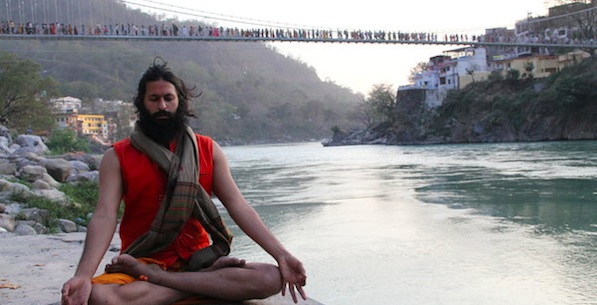Many years ago, I embarked on an intensive course in personal development (to borrow the catch-all phrase favored by a New Agey character in Vikram Gandhi’s first-person documentary, Kumaré). Early on, the profoundly confident leader declared that the second-biggest fear that drives people is the fear of being conned.
Hmmm, I thought. That’s interesting, and unexpected. So what’s number one? What is the biggest concern that keeps people from having satisfying, self-actualized lives? He paused for a moment, allowing us to come up with our own answer, then delivered a bombshell: The fear that someone will find out we’ve been conned.
One of the undercurrents that propels Kumaré, which follows Gandhi’s experiment in creating a guru out of whole cloth and seeing how many devoted students he can enroll, inspire and influence, is that Kumaré will eventually reveal his hoax to those trusting, well-intentioned people. Since we’re watching a documentary (which occasionally feels like a mockumentary) and are continually reminded of the camera’s presence, it’s inevitable—barring a last-minute failure of nerve by the filmmaker—that their susceptibility to being fooled will be revealed in a ruinously public manner. Frankly, our voyeurism is an important element (though hardly the only one) that keeps us watching. At the same time, it implicates us in Gandhi’s devious project. Whether you watch the doc streaming here or among the crowd at Ebertfest in Urbana, Illinois, this Saturday, April 20, 2013, you have to accept that you are complicit in Gandhi’s scam.
Only it’s not a scam, or a prank conceived by an attention-seeking filmmaker. (Perhaps unfairly, I find it easy to imagine a young, precocious Morgan Spurlock enthralled by the idea.) Gandhi, a New Jersey native in his thirties who was raised with Hindu rituals and traditions, tells us he was disappointed by his failed search in the U.S. and India for a spiritual leader with a mainline to the divine. “I guess my problem wasn’t with spirituality,” Gandhi says. “It was with spiritual leaders. Why do we need them?”
More to the point, why do we invest them with secret knowledge and higher powers? Materializing in Arizona as an enlightened teacher named Kumaré, Gandhi sets himself up as a potential fount and focal point. There are objective ways of investigating the mythology and allure of gurus, but it serves the film for Gandhi to get up close and personal with the phenomenon. And if Kumaré makes us think from time to time of Borat, the Dalai Lama and Father Guido Sarducci, well, the ever-broadening audience for documentaries demands a measure of entertainment along the way.
For a while, the film’s focus is Gandhi’s transformation more than his disciples’. He tells us he’s making up Kumare’s teachings and meditations as he goes along, and that he’s had a revelation: His potentially devastating illusion will be of real benefit if he can guide his students to the realization that they hold the power to change their lives, and are, in fact, their own guru.
This is an admirable turn of events, though the challenge for Gandhi is to persuade us that he has developed a genuine human connection with his students (all adults, importantly), and cares as much about them as he does about his film. This takes a bit of fancy footwork, because we’ve been invited to laugh at almost everyone Kumaré meets in the first 20 minutes. The most memorable seeker-slash-teacher is an “acoustic theologist” named Darrel, who employs a didgeridoo and various strange implements to generate sound vibrations in order to—well, frankly, I have no idea.
Kumaré doesn’t encourage us to identify with the New Age types the faux guru encounters, or initially with the fourteen or so people who become his most loyal students. Later, though, after the students confide their personal histories to Kumaré, such as the sacrifice of being a single mom working two jobs and raising several children or the pit of drug addiction, we come to see them as people with the same struggles and dreams we have. Their desire for non-material satisfaction is hardly uncommon in post-capitalist America.
As our empathy for Kumaré’s students increases, though, and we accept his impulse to make a lasting contribution to their lives, we find ourselves questioning—and not for the first time—the ethics of filming these people. How did Kumaré initially explain the cameras to his devotees? And how is everyone (with the exception of Gandhi-as-Kumaré, who winks at us every now and then) able to ignore the camera? Or, to quote a famous philosopher, who’s zooming who? (After all, my second-biggest fear is being conned.)
Then again, in the same way that Kumaré serves as a mirror reflecting what each student wants from him, Kumaré reflect our attitudes toward spiritual seekers. Do you see New Agers as needy airheads, looking for a god in all the wrong places? You’ll find ample confirmation. Do you believe that transformation is available to every one of us at every moment? There’s plenty of support for that attitude as well.
On the other hand, if you wonder whether cinema verité—so-called fly-on-the-wall, observational filmmaking—is no longer an effective means of approaching or discovering reality in an age when everyone is adept at performing for the camera, Kumaré will make you question your assumptions. Kumaré’s students, if they have the courage to watch the film, would have to concede that the camera never lies. Even when it’s documenting a con.




